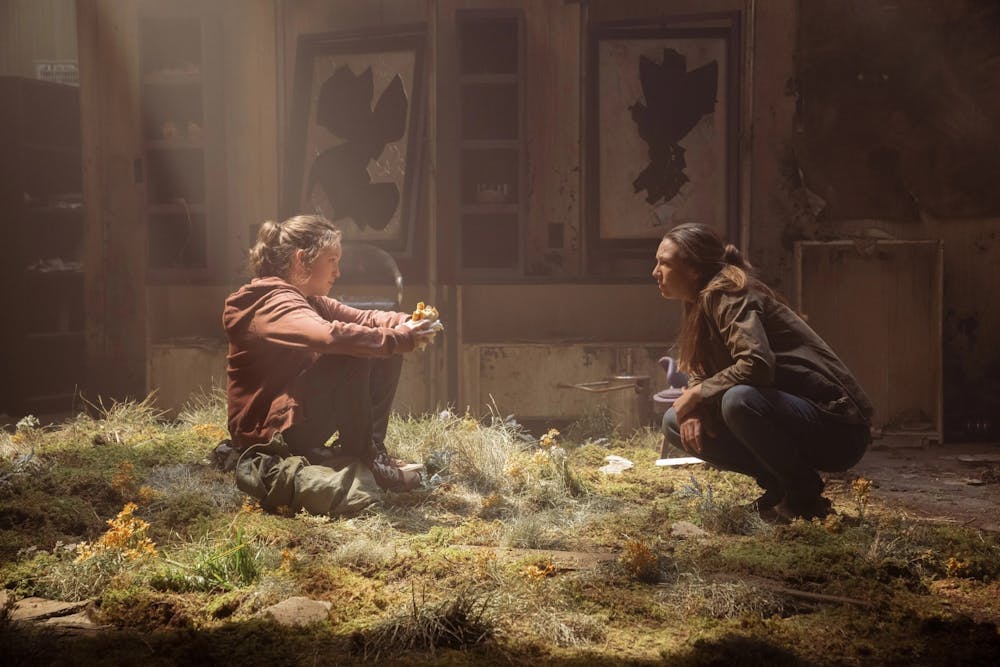SPOILER ALERT: This column contains potential spoilers about the first episode of “The Last of Us.”
Episode One: “When You’re Lost in the Darkness”
I’m intrigued by how video games tell stories — but it’d be stupid to call me a gamer.
I dabble, you know? I know the names of a lot of games, but that’s mostly because of my brother, who knows more about games than I could ever have the capacity for. I do play “Mario Kart.” And “Wii Sports Resort.” All the LEGO games, too. And, randomly, I play “Grand Theft Auto.”
Poorly, though.
What I’m interested in is world-building. For most games, I’d rather watch an excellent gamer play while I’m on the sidelines. Because — from Panem to the Wizarding World to Gotham to Jurassic Park — simple and complex universes alike need the building blocks of literary life: characters and character attributes. Setting and imagery. History and context.
And video games achieve that, too.
Related: [COLUMN: Vulfpeck’s whimsy reaches new heights on ‘Schvitz’]
I strongly believe video games have become so advanced and well-done that some can be considered high art. And I absolutely believe that episode one of “The Last of Us” — an adaptation of the popular, extremely well-reviewed 2013 video game — is high art.
It’s poignant to reimagine Earth. Obviously, every fictional book, show and movie set on this planet is some sort of reimagining. They’re all technically a series of parallel universes — none of which actually exist, no matter how similar they are to the one we know — but all of which ask the question, “What if this happened to this person in this place at this time?”
If we break down the world of “The Last of Us,” we’re left with a disturbing scene. In the first episode, we open in 1968, with two epidemiologists on a Dick Cavett-style show. One of them admits that his fear doesn’t involve the illnesses humans have faced and conquered in the past, but, rather, fungal infections. “Billions of puppets with poisoned minds,” the epidemiologist remarks.
The cold open creepily sets up the rest of the episode, where we’re thrust, relatively quickly, into an apocalyptic Earth where a parasitic fungus — cordyceps — takes over. The fungi turn humans into zombie hosts, with their only goal being to spread infection. Flash forward 20 years, and we’re placed in Boston, where the world has been ravaged.
The first episode of “The Last of Us” already poses a lot of uncomfortable questions. Is it ethical to drive past a family on the side of the road with a small child to save yourself — just like Joel (Pedro Pascal) told his brother Tommy (Gabriel Luna) to do? Is it okay to kill someone who could screw up the entire future of humanity? Is there potential to replace someone you loved with someone else?
And do any of these questions matter when your innate sense of self-preservation is the only goal you can understand?
Related: [‘The Book of Mormon’ to open at IU Auditorium Jan. 17]
Joel is struggling with all of this. His daughter Sarah (Nico Parker) dies by gunshot in 2003 during that first horrific night of the apocalypse, demonstrating how quickly trigger-happy soldiers were becoming scared of the unknown. And, later in the episode, Joel beats an officer to death in front of the all-important Ellie (Bella Ramsey), clearly allowing his paternal instinct to take over — in a very violent manner — almost in an act of revenge.
This show demands a lot of you. I’m worried that in the age of social media, though, people will scroll with this on in the background. I’m also worried that those who are faint of heart will avoid it. And yeah — I won’t lie to you: it’s disgusting. It’s about a parasitic virus that turns humans into cannibalistic, zombie-like creatures. There’s blood. There are jump scares. There are upsetting, jerky, non-human movements made by “humans.” But, like Joel said, “We’re gonna be brave.”
“When You’re Lost in the Darkness” is a heartbreaking episode of television. It’s also nauseating. You might have to take a break — it’s almost 90 minutes of pure anxiety. But the fact that it can explore so many disturbing themes effectively, without coming across as tasteless, is astonishing. Given the world that “The Last of Us” exists in, it would be incongruous for such graphic elements to be excluded.
As a non-gamer, I can say with 100% certainty that this show is for us, too. But I still have many questions for people who’ve played the game and are watching the show. When you play a video game, is the goal simply to win, or to also engage with the morality of the game? Does TV, then — because it takes out the aspect of competition — allow for the hair-raising questions to sink in more? You’re no longer a participant, but a viewer.
I don’t have many answers yet, but I can keep asking questions. And the most important question I can ask at this moment — as a critic — is “Do I think this is good television?”
Yes. A proper, forceful “yes.” This is damn good television.






